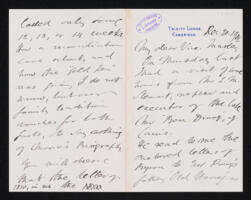First line 'Nocte mihi ferro blandum suadente soporem...' The piece does not appear to have been marked, as might be expected for schoolwork.
The Shiffolds, Holmbury St Mary, Dorking. - Bessie is doing well, and 'sits up in bed a great deal'; Paul is also well. The thaw 'set in last night', and Robert hopes it will continue. Sees in the papers that Wallington is 'cut off': that is 'unpleasant' but may not matter so much, but it could be 'serious for some of the scattered farms' and he hopes it will not last long. Bessie says that 'but for Paul' his parents might both be snowed in at Wallington, so 'in spite of all the inconvenience he has caused' he may at least have saved them from that.
They have not suffered much here as the snow was never too deep. Some of the neighbours have influenza: both at High Ashes [home of Sir Roland and Lady Vaughan Williams] and Mrs Vaughan Williams at Leith Hill Place, so they 'must take care not to let it come here'. Has 'Sent Jim [? Conrad's Lord Jim, see 12/105] by this morning's post': it is Tom [Sturge] Moore's, but he 'won't want it back yet'. Wonders whether his father will 'make anything of it': Robert 'found it tough at first, but afterwards was quite held by it'.
The doctor has just come and says Bessie is 'doing very well indeed'. Has been writing many letters recently, some at Bessie's dictation. People have been 'most kind in writing', some have sent presents for Paul. Hopes his parents and Booa are well; sends love and 'best wishes for 1907' from him and his family'.
Sloperton, Chippenham - Concerning the Byron statue.
Trinity Lodge, Cambridge.—Encloses six letters (2–7) written by Lord Byron to Henry Drury, which have been bequeathed to the college by the son of the recipient.
—————
Transcript
Trinity Lodge, Cambridge
Dec. 20. 1902
My dear Vice-Master,
On Thursday last {1} I had a visit of some hours from Mr L. M. Stewart, nephew and executor of the late Mr “Ben Drury,” of Caius {2}.
He read to me the enclosed letters of Byron to Mr Drury’s father, “Old Harry” as he was called at Harrow, a Son of Dr Joseph Drury the Head Master.
He left out one sentence in one letter about the Turks, which he told me was disgusting {3}, and I have not seen it.
The letters date between 1807 {4}, when the Hours of Idleness were published, and 1815 soon after Byron’s Marriage.
As there are numerous references to my Father, it may be well just to point out that my Father succeeded Dr Drury at Easter, 1805, and that Byron left the School that summer, i.e. I suppose, at the end of July. Consequently, their relation as Master and Pupil lasted only some 12, 13, or 14 weeks. How a reconciliation came about, and how the “gold pen” was given, I do not know, but our family tradition vouches for both facts, to say nothing of Moore’s Biography.
You will observe that the letter of 1810, in wh. the {5} reference to the “gold pen” occurs, describes the famous swim from Sestos to Abydos, and adds—what I had either not known or forgotten—that the swimmer had made a previous attempt which failed.
May I ask you and Dr Sinker kindly to take Charge of the letters, which Mr Benjamin Drury bequeathed to our Library, and to consider where and in what form they may best be kept. The fact that they are a bequest should be specially recorded.
Perhaps it might also be recorded that Dr Joseph Drury, the Grandfather of the Testator, was himself a Trinity man. His Son, “Old Harry,” to whom Byron wrote the letters, was at Eton and King’s.
I am, my dear Vice-Master,
Most truly yours
H. Montagu Butler
—————
2 folded sheets.
{1} The 18th.
{2} Benjamin Drury’s sister Emily (1813–1902) married Stewart’s father, Lestock Wilson Stewart (1824–1876), an army doctor, in India in 1852.
{3} See the letter of 3 May 1810 (R.2.40A/4). Stewart may well have omitted more than one sentence.
{4} The earliest of the letters (R.2.40A/2) in fact dates from 13 January 1808, but it was misdated 1807.
{5} ‘1810’ struck through.
